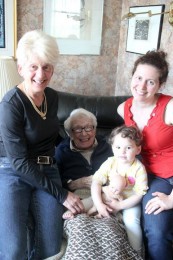How Grandparents Do Money

My grandma is 101-and-a-half. (With centenarians, like toddlers, you have to be exact.) Most likely, she is NYU’s oldest living alumnus. She graduated with a degree in Journalism during the Depression, back when Journalism was an actual career people had. Born in what’s now Bed Stuy, she has lived in the same cushy DC two-bedroom high-rise condo for several decades, with a view out onto the pool. From the time my grandpa died in the early aughts until this past October, she had only MSNBC for company. Now she has a live-in nurse. Still, she reads, and knits, and does her exercises, and she could teach me lots of lessons about life and finances, if only she remembered things anymore.
My grandpa handled the money over their 55+ years of marriage. Once he was gone, my mother had to teach my grandma how to use an ATM. Money in the abstract makes her nervous: she has very little sense of what things cost anymore, prefers to spend as little as possible, frets about whether she has enough. She does. Though my grandpa was born in a tenement building on the Lower East Side, in a family so large and poor he didn’t have a bed to sleep in let alone a bedroom, he too went to college — CCNY, baby! — and then to war and to work, hoisting his own family into the middle class, and then further up, because why stop there?
What he made, he invested, and the stock market treated him well. Though there was that one time he had the opportunity to buy a plot of land next to what was going to be Disney World and he was like, “A movie-themed amusement park? Why would anyone think that crazy idea is going to take off?” But the same gene that kept him from making the occasional good risky investment kept him from making lots of bad ones, too.
He and my grandma bought a second home in southern Vermont, so instead of going south for the winters, they went north, where they ate salads made with local vegetables and adorned with tofu, and crunched their way through the snowbanks on long morning walks. They prioritized travel and hobbies: photography for him (he had his own darkroom), watercolors for her (she had her own studio). They hung their own art on the walls, so thankfully it was good. They shopped at outlets and garage sales. But they didn’t buy much.
I never saw them fight over money. In fact, I never saw them fight. They seemed pleased with each other, low-key, content. One time, while he and I were in the backyard in Vermont, he confessed to me that he didn’t like the patio furniture my grandma had bought. “Why don’t you say something?” I asked. “Because it doesn’t matter,” he said, “and that’s how you stay married.”
They raised two kids, who each had three kids, so they were pretty happy about that. On Friday nights, he used to make us challah by hand and then bless my brothers and me in the gravelly voice he was left with, post-throat cancer. For dessert, we ate my grandma’s sugar-free brownies, which were not exactly delicious but traditional. They tasted like what she stood for, the animating principle of her life with my grandpa: moderation. I’ve learned a lot from my grandparents, and I tell her that now, whenever I visit, and she glows at me, squeezing my hand, as though she’s hearing the compliment for the first time.
What financial lessons did you learn from your grandparents?
Support The Billfold
The Billfold continues to exist thanks to support from our readers. Help us continue to do our work by making a monthly pledge on Patreon or a one-time-only contribution through PayPal.
Comments